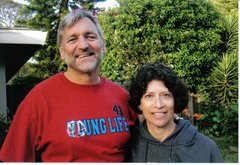Monvee is a relatively new "spiritual direction" program, kind of a "spiritual director" in a box. Monvee is in the development stage in anticipation of a worldwide roll-out some time next year, (or maybe even later this year?) You can investigate Monvee at www.monvee.com, but briefly, Monvee is a tool for individuals and churches to assist in personal spiritual formation. It includes an assessment, which leads to a summary and ultimately a "road map" personalized to each individual. My personal opinion after taking the assessment and participating in the Beta project is that this could be a very useful tool for both individuals and churches, but that it is focused on the 15-35 yr. old age range. So, older folks (yea, like me) may find the tool and process intimidating or confusing, and need help to get through the process. That said, Monvee includes very helpful resources and plans tailored to each person's character and "style". I would say that it can complement spiritual direction, but that a soul friend or director may still be necessary? Nothing helps like a humble, good listening brother or sister in Christ. Obviously, the key to spiritual transformation is our relationship with Christ, and through Him, with our Father and the Holy Spirit. Ultimately, our formation and transformation are the work of Jesus Christ as we surrender to Him.
As for spiritual formation, spiritual direction, transformation, etc., here are some very good thoughts collected from; The Spirit of the Disciplines (Willard), The Imitation of Christ (a' Kempis) and finally from the community of Northumbria - a "monastic" community living out their lives in the world in a daily exercise of faith and action in Christ Jesus. I have formulated those thoughts into a more brief treatment for the sake of brevity (at least relative brevity.):
Spiritual formation as envisioned by the ancient fathers and mothers of the church includes both contemplation and action. Service ("works") is seen as a natural outgrowth of our transformation in Christ Jesus. I think Jesus on the shore cooking up some fish for his disciples summed it up best . . . "Do you love me?" (contemplation) . . . "Feed my sheep." (action). The best of the monastic communities all served the Lord well out of their deep love and communion with Him.
Humility is both a key and a difficulty in the process of transformation. From the Imitation, Jesus says, "You have nothing in you in which you can glory, but there is much in you for which you ought to humble yourself. You are much weaker than you think." And further, "We inquire about how much a man might accomplish . . . but we should be asking whether he is poor in spirit, meek and patient, or how devout he is." If we enter into the process of transformation under and in Christ, we should become humble as He reveals ourselves to us in His Light. In the Light of God our sin and shortcomings become all too visible, and we are humbled if our hearts are inclined toward Him.
Now what about this "works" thing. Christian doctrine tells us that salvation is a gift of Grace, and that nothing we do can earn it. But Jesus own brother, James, teaches us that "faith without works is dead." Martin Luther had considerable trouble with this teaching because he saw how the church in his time abused this teaching. But even Luther concluded that works are indeed the result of faith. That even before works can be proposed, faith will have them done. The point is our response to the abundant LOVE shown us by God through Christ Jesus, in that response there is no "work" only a life lived in response to Christ's love and servanthood on our behalf. We are to become the "imitation of Christ" in our daily lives, reflecting His character (The Sermon on the Mount), while our own fleshly lives are "hidden in Christ".
Finally, (as I know this much too long and it's getting late here), I love the "Rule" of the community of Northumbria, which I am trying to incorporate into my own life:
"This is the Rule we embrace. This is the Rule we will keep: we say YES to AVAILABILITY; we say YES to VULNERABILITY.
We are called to be AVAILABLE to God and to others:
Firstly to be available to God in the cell of our own heart when we can be turned towards Him, and seek His face;
then to be available to others in a call to exercise hospitality, recognizing that in welcoming others we honor and welcome the Christ Himself;
then to be available to others through participation in His care and concern for them, by praying and interceding for their situations in the power of the Holy Spirit;
then to be available for participation in mission of various kinds according to the calling and initiatives of the Spirit.
We are called to intentional, deliberate VULNERABILITY:
We embrace the vulnerability of being teachable expressed in:
a discipline of prayer;
in exposure to Scripture;
a willingness to be accountable to others in ordering our ways and our heart in order to effect change.
We embrace the responsibility of taking the heretical imperative:
by speaking out when necessary or asking awkward questions that will often upset the status quo;
by making relationships the priority, and not reputation.
We embrace the challenge to live as church without walls, living openly amongst unbelievers and other believers in a way that the life of God in ours can be seen, challenged or questioned. This will involve us building friendships outside our Christian ghettos or club-mentality, not with ulterior evangelistic motives, but because we genuinely care."
Clearly, spiritual formation/transformation happens through both contemplation and action working together in Christ Jesus and the Power of Holy Spirit at work in us.
and all this can truly be accomplished . . .
only by Grace,
pat
"Love one another, by this love the world will know me and my Father who sent me."
Subscribe to:
Post Comments (Atom)










No comments:
Post a Comment